Solar panels are an essential part of harnessing solar energy to power homes and businesses. It is crucial to keep them clean for optimal performance. This article explores what solar panels are, how they work, and why they need cleaning. We discuss factors contributing to dirt buildup, the recommended cleaning schedule, the benefits of cleaning solar panels, and tips for safe and effective cleaning. Keep reading to learn more about the importance of solar panel maintenance.
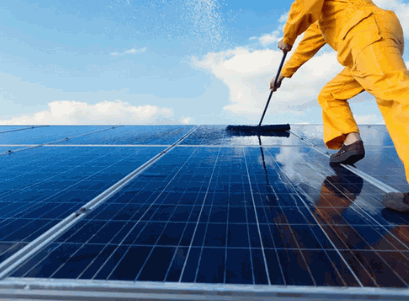
Contents
What Are Solar Panels?
Solar panels are devices that convert sunlight into electrical energy, offering a renewable source of power that is increasingly popular for both residential and commercial use due to their efficiency and ability to generate significant energy output.
Solar panels come in various types, including monocrystalline, polycrystalline, and thin-film options.
- Monocrystalline panels are known for their high efficiency rates.
- Polycrystalline panels are more cost-effective.
- Thin-film panels are flexible and lightweight, making them versatile for different installations.
In today's energy landscape, the importance of solar panels cannot be overstated. They play a vital role in reducing reliance on fossil fuels and mitigating climate change by harnessing clean, renewable energy from the sun.
Discover more: Can You Get A Grant For Solar Panels
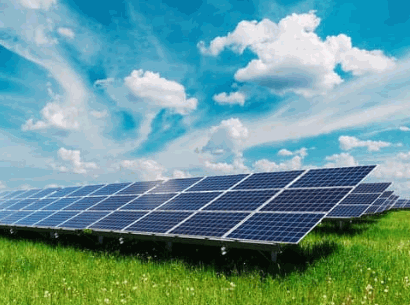
How Do Solar Panels Work?
Solar panels work by using photovoltaic cells to capture sunlight and convert it into electricity, forming the basis of a solar energy system that can power a range of devices and applications.
The photovoltaic cells within the solar panels are made of semiconductor materials, such as silicon, which generate an electric current when exposed to sunlight. This direct current (DC) electricity produced by the cells is then sent to an inverter, a crucial component that converts it into alternating current (AC) electricity, suitable for powering household appliances. The inverter also ensures the synchronisation of the solar energy with the grid power, allowing excess electricity to be fed back into the grid for credits or future use.
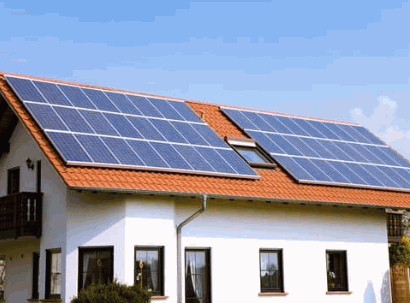
Why Do Solar Panels Need To Be Cleaned?
Keeping solar panels clean is crucial for maintaining their efficiency and maximising power output, as dirt build-up, dust, and other environmental factors can significantly reduce their performance.
Dust and Dirt Buildup
Dust and dirt build-up on solar panels can severely affect their efficiency, especially in dry conditions where there is minimal rainfall to naturally clean the panels.
Over time, the layer of grime that accumulates on solar panels can act as a barrier, reducing the amount of sunlight that reaches the photovoltaic cells underneath. This obstruction impedes the panels' ability to convert sunlight into electricity, ultimately leading to decreased energy production. The efficiency of the solar panels diminishes as more dust settles on their surface, affecting their overall performance. Regular cleaning is therefore crucial to maintain optimal performance and ensure that the panels continue to operate at their full capacity.
Bird Droppings
Bird droppings can create significant obstacles for solar panels, blocking sunlight and reducing their efficiency if not cleaned regularly.
These droppings contain various elements like ammonia and uric acid which can corrode the protective layer of the solar panels, leading to long-term damage.
The accumulated debris can create a physical barrier, hindering the panels from absorbing sunlight effectively.
Cleaning bird droppings off solar panels can be a challenging task, requiring frequent maintenance to ensure optimal performance.
Without proper cleaning, the gradual build-up of bird excrement can cause serious declines in energy output, impacting the overall efficiency of the solar panel system.
Tree Sap and Pollen
Tree sap and pollen can form a sticky layer on solar panels that is difficult to remove, which can drastically affect the panels' ability to generate power efficiently.
When tree sap and pollen accumulate on solar panels, they create a barrier that hinders sunlight absorption, reducing the panel's energy output. This obstruction can lead to a decrease in the overall performance and efficiency of the solar system, ultimately impacting energy production.
Regular maintenance and cleaning of solar panels are crucial to ensure maximum sunlight exposure and optimal power generation. Cleaning the panels with a soft brush and gentle detergent solution can help remove the sticky residue without damaging the surface, promoting higher energy yields.
Pollution and Smog
Pollution and smog can deposit particulate matter on solar panels, reducing their ability to capture sunlight effectively and thus compromising their efficiency.
This build-up of dust, dirt, and pollutants creates a barrier between the solar panels and the sun's rays, diminishing their output. Over time, this can lead to a significant drop in energy production, affecting the overall performance and lifespan of the panels. In polluted environments, regular cleaning becomes crucial to ensure the optimal functioning of solar panels.
By implementing proper cleaning techniques, such as using gentle detergents and soft brushes, panel owners can effectively remove debris and maintain peak efficiency. Scheduling routine inspections and maintenance checks can help detect any issues early on, preventing more severe damage from occurring.
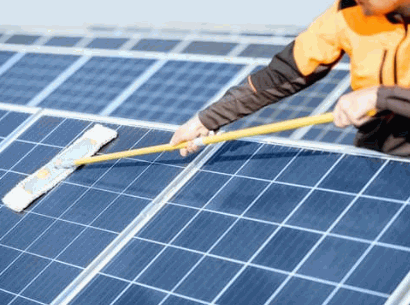
How often should solar panels be cleaned?
Determining how often solar panels should be cleaned depends on several factors, including the environment, weather conditions, and the specific recommendation of the panel manufacturer.
Factors Affecting Cleaning Frequency
Factors such as the surrounding environment, weather patterns, and the level of atmospheric pollution all play a role in determining how often solar panels require cleaning.
In terms of the surrounding environment, different locations may have varying degrees of dust, debris, or bird droppings that can accumulate on solar panels, impacting their efficiency.
The weather patterns, including rainfall frequency and intensity, also influence the rate at which dirt builds up on the panels, with areas experiencing prolonged dry spells likely needing more frequent cleaning.
Atmospheric pollution can deposit pollutants on the panels, reducing their ability to generate electricity efficiently and increasing the need for regular cleaning to maintain optimal performance.
Recommended Cleaning Schedule
A recommended cleaning schedule for solar panels often includes bi-annual or annual cleanings, depending on the manufacturer's guidelines and the specific operating environment.
It is important to consider the surrounding factors that can impact the efficiency of your solar panels, such as the presence of dust, pollen, bird droppings, or air pollution.
Regular maintenance can help ensure optimal performance and prolong the lifespan of your solar panels. A suggested routine is to inspect your panels monthly to check for any visible debris or dirt accumulation.
Adhering to a thorough cleaning regimen will prevent any buildup that could hinder sunlight absorption and negatively affect energy production.
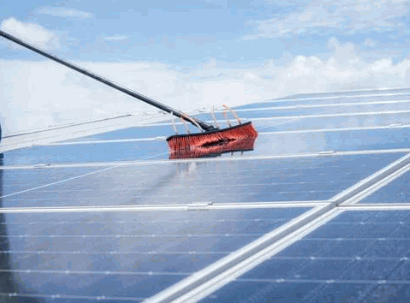
What Are The Benefits Of Cleaning Solar Panels?
Cleaning solar panels regularly offers numerous benefits, including increased efficiency, extended lifespan, and improved aesthetics, all of which contribute to the overall performance of the solar energy system.
Increased Efficiency
Regular cleaning of solar panels can significantly increase their efficiency, ensuring they operate at their maximum power output and deliver optimal energy production.
When solar panels are covered with dirt, dust, pollen, bird droppings, or other debris, their ability to absorb sunlight and convert it into electricity is hindered. Clean panels allow for the unobstructed flow of sunlight, optimising their performance and enhancing energy generation.
Maintaining high efficiency in solar panels not only fosters sustainable energy production but also prolongs the lifespan of the system, reducing the need for costly repairs or replacements.
By incorporating a regular cleaning schedule for solar panels, individuals can enjoy increased energy savings and contribute towards a cleaner environment.
Longer Lifespan
Proper maintenance and regular cleaning can extend the lifespan of solar panels, ensuring they continue to work efficiently and effectively for many years.
By regularly cleaning and maintaining solar panels, individuals can prevent the accumulation of dirt, dust, and debris that can hinder their performance. This routine care helps to maximise the absorption of sunlight, thereby enhancing energy production and overall efficiency.
Moreover, consistency in upkeep is key to identifying any potential issues early on, minimising the need for costly repairs or replacements in the future. It is crucial to adhere to the manufacturer's guidelines and scheduled maintenance plans to prolong the life of solar panels and optimise their performance.
Better Aesthetics
Clean solar panels enhance the overall aesthetics of a property, whether they are installed on roofs or ground-mounted systems.
When solar panels are clean and free of dirt, dust, or debris, they appear sleek and reflective, contributing to a visually pleasing exterior that complements the architecture of the building. A well-maintained solar panel installation can significantly boost the kerb appeal of any property, creating a positive impression on visitors and passers-by.
Clean solar panels allow for maximum light absorption, ensuring optimal energy production efficiency. This not only benefits the environment by harnessing more renewable energy but also helps in maximising the return on investment for the property owner.
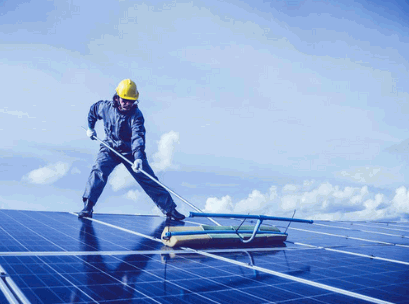
How To Clean Solar Panels?
Cleaning solar panels involves several methods, including:
- Manual cleaning with water and brushes
- The use of automated cleaning robots
- Hiring professional cleaning services to ensure the panels are free from dirt and debris
Do's and Don'ts of Cleaning Solar Panels
In terms of cleaning solar panels, it's important to follow certain do's and don'ts to ensure they are cleaned effectively without causing damage.
One common mistake to avoid is using abrasive materials or harsh chemicals that can scratch or degrade the panel's surface. Opt for gentle cleaning solutions approved by the manufacturer, and always test a small area first.
Another key consideration is the appropriate use of water. While it's essential to use water to clean solar panels, using excessive amounts can lead to mineral deposits that reduce efficiency. Therefore, aim for a moderate amount of water that is sufficient to remove dirt without leaving residue behind.
Professional cleaning services can offer specialised tools and techniques to safely and effectively clean solar panels. They can also identify any potential issues that may require maintenance, ensuring optimal performance and longevity.
Cleaning Methods
Various cleaning methods for solar panels include manual cleaning with brushes and water, using robots for automated cleaning, and portable solar cleaning tools for convenience.
Manual cleaning with brushes and water is a traditional approach that can effectively remove dirt and debris from solar panels. It is cost-effective and simple but can be time-consuming, especially for large installations.
On the other hand, using robots for automated cleaning offers efficiency and precision, ensuring thorough cleaning without human intervention. The initial investment in robotic cleaning systems can be significant.
Portable solar cleaning tools, such as handheld sprayers or squeegees, provide a quick and easy solution for spot cleaning or touch-ups. These tools are ideal for regular maintenance and addressing minor issues promptly. They may not be suitable for deep cleaning or large-scale operations.
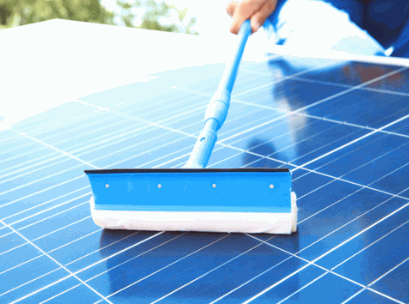
What Are The Safety Precautions When Cleaning Solar Panels?
Ensuring safety while cleaning solar panels is paramount, especially when working on rooftops, and it is often recommended to hire professional services to mitigate risks.
In terms of safety precautions, it is crucial to always ensure that the solar panels are switched off before attempting to clean them. This not only protects you from electric shocks but also prevents any damage to the panels due to accidental water exposure. Using the correct equipment such as soft-bristle brushes and non-abrasive cleaners is essential to avoid scratching or cracking the panels.
Professional services not only guarantee safety but also ensure a thorough and efficient cleaning process. They have the expertise to identify any potential issues with the panels and can provide maintenance tips to enhance their longevity. Professionals are equipped with the necessary tools and techniques to clean even hard-to-reach areas, ensuring optimal panel performance.
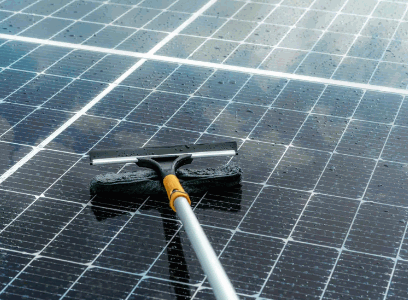
Conclusion
Maintaining clean solar panels is essential for maximising their efficiency, longevity, and overall performance, which underscores the importance of regular cleaning and proper maintenance practices.
By keeping solar panels clean, you ensure that they can absorb the maximum amount of sunlight, converting it into energy more effectively. This directly impacts the efficiency and output of your solar energy system, ultimately leading to cost savings and environmental benefits. Regular cleaning also prevents the build-up of dirt, dust, and debris, which can hinder the panels' ability to function efficiently over time.











